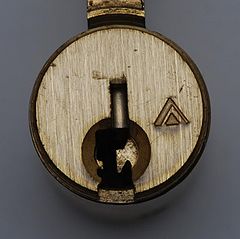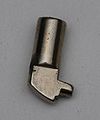Schlage Everest
Schlage Everest
| Schlage Everest | |
 | |
| Name | Schlage Everest |
|---|---|
| Manufacturer | Schlage |
| Lock Type | Cylinder |
| Lock Design | Pin-tumbler, Side pin |
| Patent | US 5,715,717 |
| Related Locks | |
| Schlage Primus Schlage Everest 29 SL Primus XP | |
The Everest is a pin-tumbler lock made by Schlage. It uses six pin-tumblers and a single side pin as locking components. The Everest is notable because of the security implications of the side pin. It is commonly referenced in locksport literature as an example of defeating the security of auxilliary locking mechanisms. It is easily identified by the Everest logo on the face of the plug.
The Everest has since been superseded by the Schlage Everest 29 SL Primus XP.
Principles of operation
The Everest functions much like a traditional pin-tumbler cylinder, but with the addition of the side pin. There are 6 pin-tumblers with 10 depths each, a total of 1,000,000 (106) theoretical key differs. The side pin is on the bottom of the plug in the 5 o'clock position. It is spring biased into the cylinder, and prevents rotation of the plug in this position. The side pin is a static size and all Everest keys will lift the side pin to the correct position. The side pin does not check to see if it was overlifted, much like the early Egyptian pin-tumbler locks.
The Everest side pin.
Notes
- The Everest key has a portion removed below the side pin bitting to ensure that the key cannot be repurposed for Schlage Primus cylinders.[1]
- The Everest does not use security pins.
Disassembly instructions
The Everest is diassembled in the same way as a traditional pin-tumbler lock, with consideration for the side pin. Like the finger pins in many sidebar locks, the side pin will be driven out of the exposed plug when there is no key inserted.
- Remove the cam or C-clip.
- Insert the key and turn the plug 45-90 degrees.
- Withdraw the plug from the cylinder. (A plug follower is recommended)
OR
- Remove the chamber casings and take out each pin-stack individually
- Remove the cam or C-clip.
- Withdraw the plug from the cylinder.
Vulnerabilities
All Everest keys have the same side pin bitting. Any key blank with the proper keyway profile can be used to make a working key or a bump key. This also means that any Everest key may be filed in half and used to neutralize the side pin. The modified key can also be used to provide tension.[2] The side pin can also be picked manually, if need be.
The Everest may be vulnerable to one or more of the following:
Gallery
Pin-tumblers properly aligned in the Everest plug.
References
- ↑ Holzman, Noah. Schlage Everest Primus.
- ↑ Blaze, Matt. 2003. Notes on Schlage Everest Locks.




